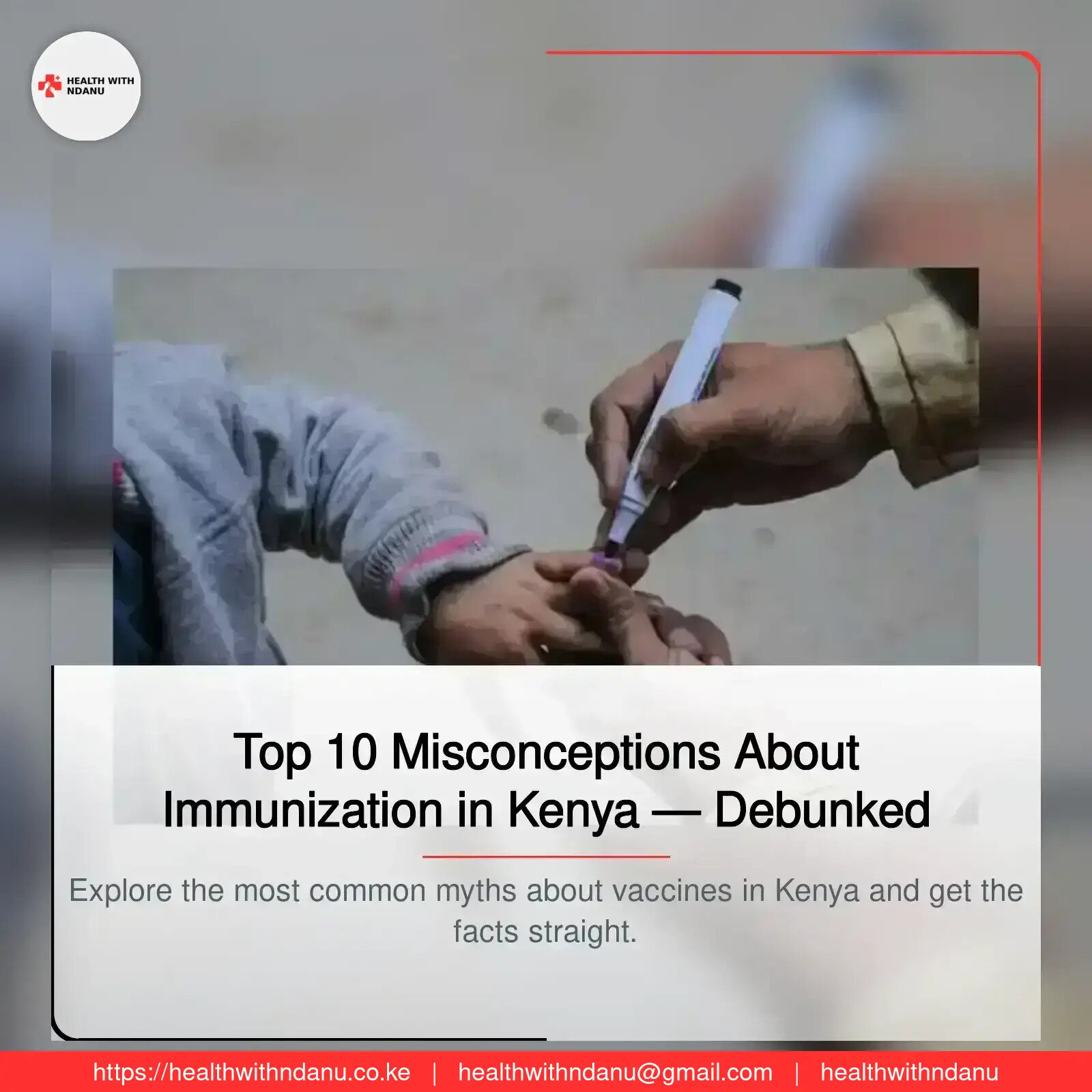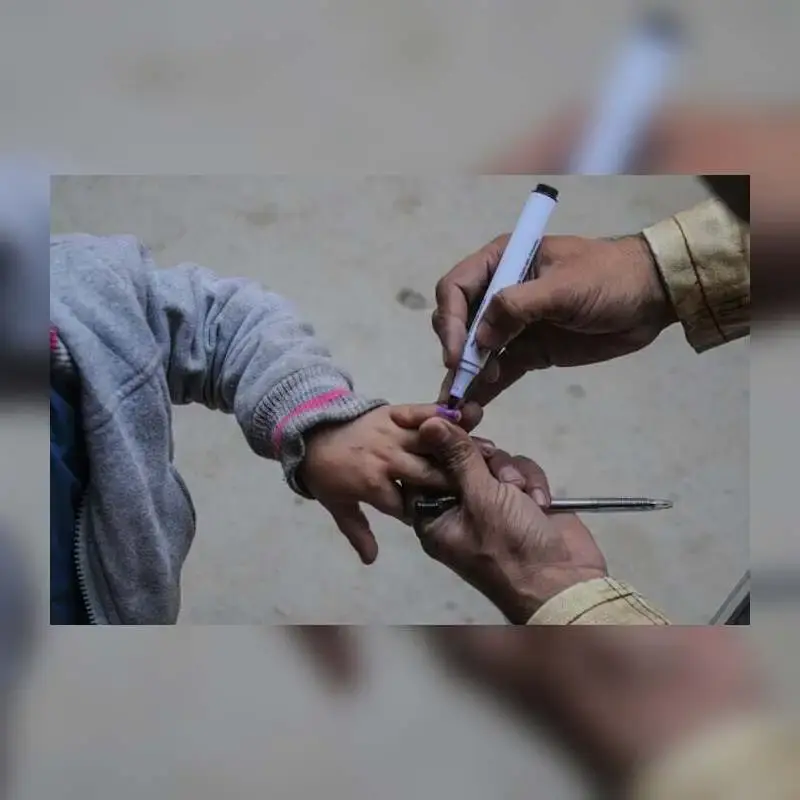Top 10 Misconceptions About Immunization in Kenya — Debunked
- by Diana Ndanu
- 24 April, 2025
- 0 Comments
- 8 Mins



Introduction:
Immunization has played an essential role in reducing preventable diseases globally, particularly in Kenya, where diseases like measles, polio, and tuberculosis have historically caused significant morbidity and mortality. However, despite its proven benefits, misconceptions about vaccines continue to spread, preventing people from seeking necessary immunizations. These myths not only affect individuals but can also undermine the effectiveness of national vaccination programs. Understanding and debunking these misconceptions is crucial for achieving better public health outcomes.
Kenya’s health system has made significant strides in immunization, with the government running national immunization programs aimed at increasing vaccine coverage and reaching underserved populations. However, myths about vaccination persist, fueled by misinformation, cultural beliefs, and mistrust of modern medicine. In this article, we will address 10 of the most common myths about immunization in Kenya and provide evidence-based facts to counter them.
1. Vaccines Cause Autism
Myth: Vaccines cause autism, particularly the MMR (measles, mumps, rubella) vaccine.
Reality: The idea that vaccines cause autism gained traction following a 1998 study by Andrew Wakefield, which was later discredited and retracted by the journal that published it. Subsequent large-scale studies have found no connection between vaccines and autism. The myth persists, but it is based on flawed science that has been debunked by the global medical community.
The widespread belief that vaccines cause autism has contributed to vaccine hesitancy in many parts of the world, including Kenya. Parents may choose to delay or skip vaccinations for their children based on this fear. This decision leaves children vulnerable to diseases that vaccines can prevent. Experts urge parents to consult with healthcare professionals who can provide accurate information about the safety of vaccines.
Key Takeaway: Vaccines do not cause autism. Vaccination is safe and vital for preventing life-threatening diseases.
2. Natural Immunity Is Better Than Vaccine-Induced Immunity
Myth: Natural immunity obtained by contracting diseases like measles, chickenpox, or polio is better than vaccine-induced immunity.
Reality: While natural immunity can occur after recovering from an illness, it comes at a significant cost. Many of the diseases that vaccines prevent can lead to serious health complications, hospitalizations, or even death. For instance, polio can cause paralysis, and measles can lead to brain damage, pneumonia, or death.
Vaccines stimulate the immune system without causing harm or the risk of severe disease. They help develop immunity without exposing the body to the dangerous consequences of the disease. Vaccines like the DTP (Diphtheria, Tetanus, and Pertussis) and the MMR vaccine provide protection with minimal risk.
Key Takeaway: Vaccine-induced immunity is safer, as it protects against diseases without causing serious illness or complications.
3. Vaccines Are Only for Children
Myth: Vaccines are necessary only during childhood, and adults don’t need to worry about getting vaccinated.
Reality: Vaccines are essential throughout life. While childhood vaccinations protect against diseases like polio, measles, and hepatitis B, adults also need certain vaccines, such as the flu shot, HPV (human papillomavirus) vaccine, and tetanus booster shots.
In Kenya, adults, particularly those in high-risk groups such as healthcare workers, travelers, and those with chronic conditions, must keep up with vaccinations. The government’s National Immunization Program (NIP) includes vaccinations for adults to protect against diseases that may still pose a threat, like influenza and pneumonia.
Key Takeaway: Vaccination is not just for children. Adults should also get vaccinated to maintain immunity and protect their health.
4. Vaccines Contain Harmful Chemicals
Myth: Vaccines are filled with dangerous chemicals like mercury and aluminum that are harmful to health.
Reality: Vaccines contain small amounts of substances such as mercury (in the form of thimerosal) and aluminum. These ingredients are used to preserve the vaccine and enhance the body’s immune response. However, the amounts used are well below the levels that could cause harm. For instance, the mercury in vaccines is a compound called thimerosal, which is used in trace amounts, and it has been shown to be safe in these quantities.
The World Health Organization (WHO) and other health agencies have reviewed the safety of these ingredients extensively. The risk of any harmful effects from these components is negligible compared to the benefits of vaccination.
Key Takeaway: The ingredients used in vaccines are carefully monitored and are present in quantities that are safe for the human body.
5. Vaccines Are Only Necessary in Urban Areas
Myth: Vaccines are more important in urban areas because there is a higher population density, and rural areas are less susceptible to outbreaks.
Reality: This myth is dangerous because it neglects the fact that diseases can spread anywhere. While urban areas may have higher rates of disease transmission due to overcrowding, rural areas are equally vulnerable to outbreaks, especially when people lack access to healthcare services.
In Kenya, health authorities have made concerted efforts to ensure that vaccines are available in both urban and rural areas. Community Health Workers (CHWs) play a key role in delivering vaccines to remote locations, ensuring that every child is protected from vaccine-preventable diseases.
Key Takeaway: Vaccination is essential in both urban and rural areas. Disease outbreaks can happen anywhere, and access to vaccines should be available to all.
6. Immunization Is Expensive and Unaffordable
Myth: Vaccines are too expensive for the average Kenyan and are not affordable for families living in poverty.
Reality: In Kenya, the government provides vaccines for free through the National Immunization Program (NIP). This initiative covers the costs of vaccines for all children under five, as well as certain vaccines for adults. These free vaccines are available in government health facilities and through outreach programs in rural areas.
The government has partnered with international organizations like the WHO and UNICEF to ensure that vaccines are distributed across the country at no cost to the public. In addition, mobile vaccination campaigns have been launched to reach remote populations who may have difficulty accessing health facilities.
Key Takeaway: Vaccines in Kenya are free, and the government works hard to make sure that every Kenyan has access to essential immunization services.
7. Vaccines Can Overload the Immune System
Myth: Getting multiple vaccines at once can overwhelm the immune system, especially in young children.
Reality: The immune system is fully capable of handling the multiple vaccines given in a single visit. Vaccines work by teaching the body how to recognize and fight specific pathogens. The number of antigens (substances that trigger an immune response) in vaccines is small compared to what the immune system encounters daily through exposure to bacteria and viruses in the environment.
In fact, giving several vaccines at once is more efficient, as it ensures that children are protected from multiple diseases early on. Research shows that the immune system can handle thousands of different antigens without being overwhelmed.
Key Takeaway: The immune system can handle multiple vaccines at once without any risk of overload.
8. Vaccines Are Only for Preventing Childhood Diseases
Myth: Vaccines are only necessary to prevent childhood diseases like measles, polio, and mumps.
Reality: While childhood vaccines are essential, vaccines also protect against diseases that affect adults. For example, the HPV vaccine can prevent cervical cancer, and the flu vaccine is recommended annually for adults. Vaccination in adulthood is crucial for maintaining immunity and preventing diseases that still circulate in the community.
Kenya’s vaccination strategy includes immunizations for adults, particularly for those with underlying health conditions or those at higher risk of exposure to infectious diseases.
Key Takeaway: Vaccination is essential throughout life, not just in childhood, to prevent diseases in adulthood.
9. Herd Immunity Makes Vaccines Unnecessary
Myth: If enough people are vaccinated, others who are not vaccinated will still be protected through herd immunity, so vaccines are not necessary for everyone.
Reality: While herd immunity can reduce the spread of diseases, relying on it alone is risky. Not everyone can be vaccinated due to medical conditions, and not all vaccines provide lifelong immunity. To achieve and maintain herd immunity, a high percentage of the population must be vaccinated.
In Kenya, where vaccination rates are still improving, relying solely on herd immunity without individual vaccination can result in outbreaks, particularly in communities with low vaccine coverage.
Key Takeaway: Vaccination is necessary for everyone to maintain herd immunity and protect those who cannot be vaccinated.
10. Vaccines Are Only Effective Immediately After Administration
Myth: Vaccines provide instant protection as soon as they are administered.
Reality: Most vaccines require time to become effective. For example, the MMR vaccine takes about two weeks to provide protection, and some vaccines, like the tetanus shot, require booster doses to maintain immunity. It’s essential to complete the full vaccination schedule to ensure maximum protection.
Delaying vaccinations or not following up with booster shots can leave individuals vulnerable to diseases, even if they’ve received initial vaccines.
Key Takeaway: Vaccines take time to become effective, and it’s important to follow the full vaccination schedule for lasting protection.
Conclusion
Vaccines are one of the most powerful tools in preventing disease and saving lives. Debunking the common myths surrounding vaccines in Kenya is crucial to ensuring that everyone, from children to adults, receives the protection they need. By increasing vaccine coverage, the government, healthcare providers, and communities can work together to eliminate vaccine-preventable diseases in Kenya and create a healthier future for all.
Got Your Own Experience? Share with us
Popular Categories
Most Visited Blogs
Daily Newsletter
Get all the top stories from Blogs to keep track.



